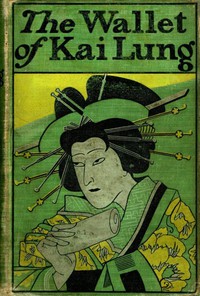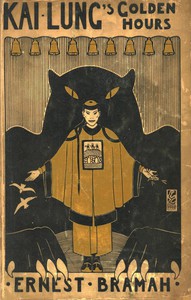The Wallet of Kai Lung by Ernest Bramah (best books to read for teens .TXT) 📕

Read free book «The Wallet of Kai Lung by Ernest Bramah (best books to read for teens .TXT) 📕» - read online or download for free at americanlibrarybooks.com
- Author: Ernest Bramah
Read book online «The Wallet of Kai Lung by Ernest Bramah (best books to read for teens .TXT) 📕». Author - Ernest Bramah
“Oh, my distinguished and really immaculate sire!” cried Yang Hu, in a voice which expressed the deepest feelings of contrition. “No oaths or vows, however sacred, can induce this person to stretch forth his hand against the one who stands before him.”
“Nevertheless,” replied Ping Siang, speaking of the matter as though it were one which did not closely concern his own existence, “to neglect the Unutterable Oath would inevitably involve not only the two persons who are now conversing together, but also those before and those who are to come after in direct line, in a much worse condition of affairs. That is a fate which this person would by no means permit to exist, for one of his chief desires has ever been to establish a strong and vigorous line, to which end, indeed, he was even now concluding a marriage arrangement with the beautiful and refined Hiya-ai-Shao, whom he had at length persuaded into accepting his betrothal tokens without reluctance.”
“Hiya-ai-Shao!” exclaimed Yang; “she has accepted your silk-bound gifts?”
“The matter need not concern us now,” replied the Mandarin, not observing in his complicated emotions the manner in which the name of Hiya had affected Yang, revealing as it undoubtedly did the treachery of his beloved one. “There only appears to be one honourable way in which the full circumstances can be arranged, and this person will in no measure endeavour to avoid it.”
“Such an end is neither ignoble nor painful,” he said, in an unchanging voice; “nor will this one in any way shrink from so easy and honourable a solution.”
“The affairs of the future do not exhibit themselves in delicately coloured hues to this person,” said Yang Hu; “and he would, if the thing could be so arranged, cheerfully submit to a similar fate in order that a longer period of existence should be assured to one who has every variety of claim upon his affection.”
“The proposal is a graceful and conscientious one,” said Ping Siang, “and is, moreover, a gratifying omen of the future of our race, which must of necessity be left in your hands. But, for that reason itself, such a course cannot be pursued. Nevertheless, the events of the past few hours have been of so exceedingly prosperous and agreeable a nature that this short-sighted and frequently desponding person can now pass beyond with a tranquil countenance and every assurance of divine favour.”
With these words Ping Siang indicated that he was desirous of setting forth the Final Expression, and arranging the necessary matters upon the table beside him, he stretched forth his hands over Yang Hu, who placed himself in a suitable attitude of reverence and abasement.
“Yang Hu,” began the Mandarin, “undoubted son, and, after the accomplishment of the intention which it is our fixed purpose to carry out, fitting representative of the person who is here before you, engrave well within your mind the various details upon which he now gives utterance. Regard the virtues; endeavour to pass an amiable and at the same time not unremunerative existence; and on all occasions sacrifice freely, to the end that the torments of those who have gone before may be made lighter, and that others may be induced in turn to perform a like benevolent charity for yourself. Having expressed himself upon these general subjects, this person now makes a last and respectfully-considered desire, which it is his deliberate wish should be carried to the proper deities as his final expression of opinion: That Yang Hu may grow as supple as the dried juice of the bending-palm, and as straight as the most vigorous bamboo from the forests of the North. That he may increase beyond the prolificness of the white-necked crow and cover the ground after the fashion of the binding grass. That in battle his sword may be as a vividly-coloured and many-forked lightning flash, accompanied by thunderbolts as irresistible as Buddha’s divine wrath; in peace his voice as resounding as the rolling of many powerful drums among the Khingan Mountains. That when the kindled fire of his existence returns to the great Mountain of Pure Flame the earth shall accept again its component parts, and in no way restrain the divine essence from journeying to its destined happiness. These words are Ping Siang’s last expression of opinion before he passes beyond, given in the unvarying assurance that so sacred and important a petition will in no way be neglected.”
Having in this manner completed all the affairs which seemed to be of a necessary and urgent nature, and fixing his last glance upon Yang Hu with every variety of affectionate and estimable emotion, the Mandarin drank a sufficient quantity of the liquid, and placing himself upon a couch in an attitude of repose, passed in this dignified and unassuming manner into the Upper Air.
After the space of a few moments spent in arranging certain objects and in inward contemplation, Yang Hu crossed the chamber, still holding the half-filled vessel of gold-leaf in his hand, and drawing back the hanging silk, gazed over the silent streets of Ching-fow and towards the great sky-lantern above.
“Hiya is faithless,” he said at length in an unspeaking voice; “this person’s mother a bitter-tasting memory, his father a swiftly passing shadow that is now for ever lost.” His eyes rested upon the closed vessel in his hand. “Gladly would—” his thoughts began, but with this unworthy image a new impression formed itself within his mind. “A clearly-expressed wish was uttered,” he concluded, “and Tung Fel still remains.” With this resolution he stepped back into the chamber and struck the gong loudly.
THE CAREER OF THE CHARITABLE QUEN-KI-TONG FIRST PERIOD:
THE PUBLIC OFFICIAL
“The motives which inspired the actions of the devout Quen-Ki-Tong have long been ill-reported,” said Kai Lung the story-teller, upon a certain occasion at Wu-whei, “and, as a consequence, his illustrious memory has suffered somewhat. Even as the insignificant earth-worm may bring the precious and many coloured jewel to the surface, so has it been permitted to this obscure and superficially educated one to discover the truth of the entire matter among the badly-arranged and frequently really illegible documents preserved at the Hall of Public Reference at Peking. Without fear of contradiction, therefore, he now sets forth the credible version.
“Quen-Ki-Tong was one who throughout his life had been compelled by the opposing force of circumstances to be content with what was offered rather than attain to that which he desired. Having been allowed to wander over the edge of an exceedingly steep crag, while still a child, by the aged and untrustworthy person who had the care of him, and yet suffering little hurt, he was carried back to the city in triumph, by the one in question, who, to cover her neglect, declared amid many chants of exultation that as he slept a majestic winged form had snatched him from her arms and traced magical figures with his body on the ground in token of the distinguished sacred existence for which he was undoubtedly set apart. In such a manner he became famed at a very early age for an unassuming mildness of character and an almost inspired piety of life, so that on every side frequent opportunity was given him for the display of these amiable qualities. Should it chance that an insufficient quantity of puppy-pie had been prepared for the family repast, the undesirable but necessary portion of cold dried rat would inevitably be allotted to the uncomplaining Quen, doubtless accompanied by the engaging but unnecessary remark that he alone had a Heaven-sent intellect which was fixed upon more sublime images than even the best constructed puppy-pie. Should the number of sedan-chairs not be sufficient to bear to the Exhibition of Kites all who were desirous of becoming entertained in such a fashion, inevitably would Quen be the one left behind, in order that he might have adequate leisure for dignified and pure-minded internal reflexion.
“In this manner it came about that when a very wealthy but unnaturally avaricious and evil-tempered person who was connected with Quen’s father in matters of commerce expressed his fixed determination that the most deserving and enlightened of his friend’s sons should enter into a marriage agreement with his daughter, there was no manner of hesitation among those concerned, who admitted without any questioning between themselves that Quen was undeniably the one referred to.
“Though naturally not possessing an insignificant intellect, a continuous habit, together with a most irreproachable sense of filial duty, subdued within Quen’s internal organs whatever reluctance he might have otherwise displayed in the matter, so that as courteously as was necessary he presented to the undoubtedly very ordinary and slow-witted maiden in question the gifts of irretrievable intention, and honourably carried out his spoken and written words towards her.
“For a period of years the circumstances of the various persons did not in any degree change, Quen in the meantime becoming more pure-souled and inward-seeing with each moon-change, after the manner of the sublime Lien-ti, who studied to maintain an unmoved endurance in all varieties of events by placing his body to a greater extent each day in a vessel of boiling liquid. Nevertheless, the good and charitable deities to whom Quen unceasingly sacrificed were not altogether unmindful of his virtues; for a son was born, and an evil disease which arose from a most undignified display of uncontrollable emotion on her part ended in his wife being deposited with becoming ceremony in the Family Temple.
“Upon a certain evening, when Quen sat in his inner chamber deliberating upon the really beneficent yet somewhat inexplicable arrangement of the all-seeing ones to whom he was very amiably disposed in consequence of the unwonted tranquillity which he now enjoyed, yet who, it appeared to him, could have set out the entire matter in a much more satisfactory way from the beginning, he was made aware by the unexpected beating of many gongs, and by other signs of refined and deferential welcome, that a person of exalted rank was approaching his residence. While he was still hesitating in his uncertainty regarding the most courteous and delicate form of self-abasement with which to honour so important a visitor—whether to rush forth and allow the chair-carriers to pass over his prostrate form, to make a pretence of being a low-caste slave, and in that guise doing menial service, or to conceal himself beneath a massive and overhanging table until his guest should have availed himself of the opportunity to examine at his leisure whatever the room contained—the person in question stood before him. In every detail of dress and appointment he had the undoubted appearance of being one to whom no door might be safely closed.
“‘Alas!’ exclaimed Quen, ‘how inferior and ill-contrived is the mind of a person of my feeble intellectual attainments. Even





Comments (0)